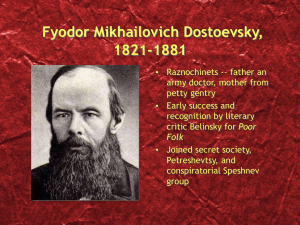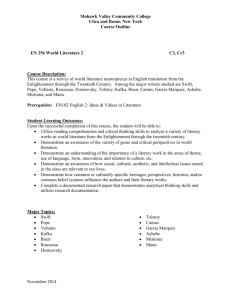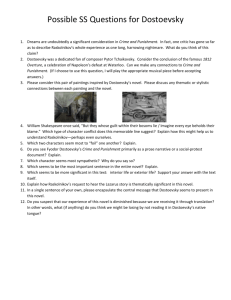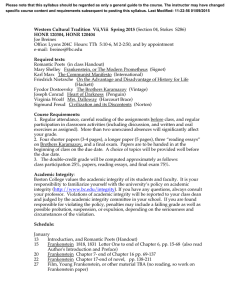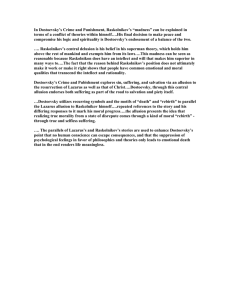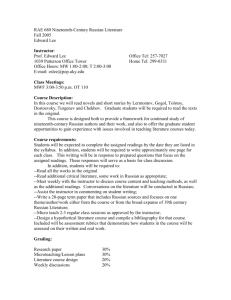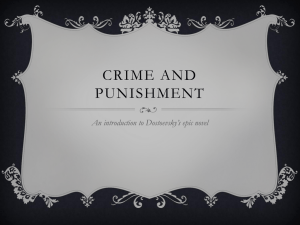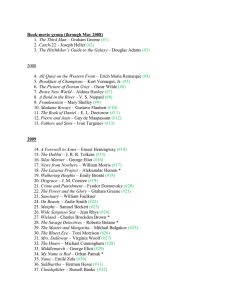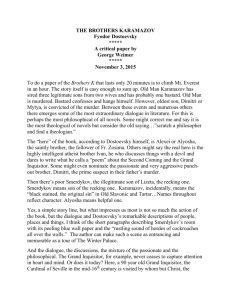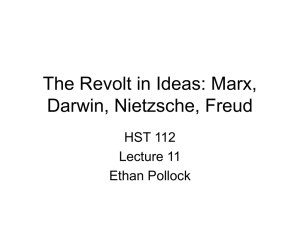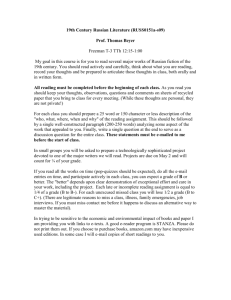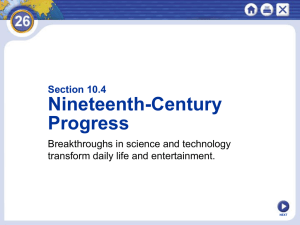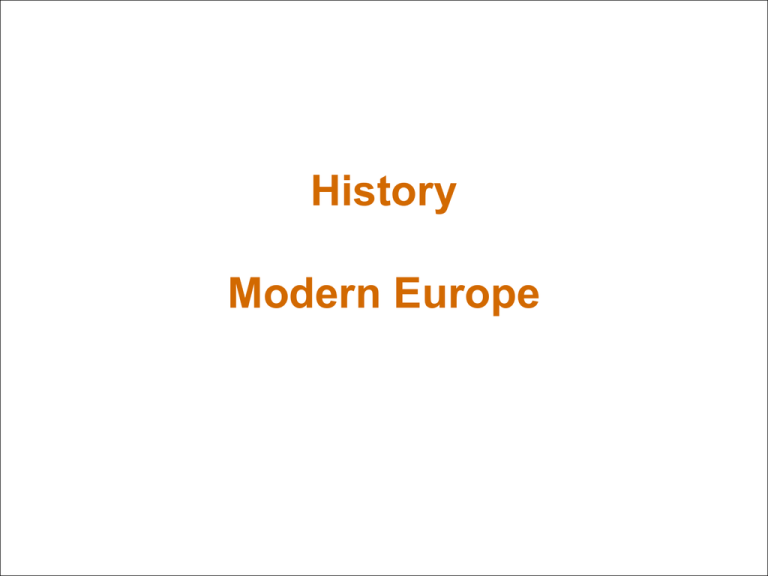
History
Modern Europe
Sigmund Freud ( 1856-1939)
A civilization which leaves so large a number of its participants unsatisfied and drives them
into revolt neither has nor deserves the prospect of a lasting existence.
Chronology
•
The most important moments in Sigmund Freud's life and genesis of his work
1856 - 6 May: is born (to change his name to Sigmund at 22). According to custom, he
is also given a Jewish name: Schlomo. His birthplace is Freiberg (nowadays
Pribor) in Moravia (the Czech Republic).
1873 - He receives a summa cum laudae award on graduation from secondary school.
He is congratulated on his style in German. He is already able to read in several
languages. Under his colleague's Heinrich Braun influence, he plans to study law
but finally decides in favor of medical school, after having attended a lecture on
Goethe's essay On Nature. Start his studies at Vienna University.
1876 - His first personal research in Trieste, on sexual glands of anguilas. Joins
Brucke's laboratory.
1877 - Publishes the result of his anatomical research on the central nervous system
of a specific larva.
1881 - A delayed award of a doctor's degree in medicine.
1884 - Discovers the analgesic properties of cocaine. Carl Koller is the one publishing
a successful study in that respect. Freud himself uses cocaine as a tonic but
prescribes it to his friend Fleischl who was morphine addicted, thereby
aggravating his situation. He is criticized in medical circles.
1885 - Hold a temporary position in a private clinic where hypnosis is used. He
destroys all his documents in April. He is appointed Privatdozent, then is
awarded a grant for a study tour and chooses to go to Paris, to visit Charcot at
the Salpetriere Hospital. He is able to observe the manifestations of hysteria
and the effects of hypnosis and suggestion here. Charcot leaves him with
special impression. Freud volunteers to translate his lectures.
1900 -Interprataion of dreams was released, the fundamental work for the whole of
psychoanalytic theory
1902 - professor at University of Vienna
1930 -becomes the winner of Goethe’s Literary Prize
1939 - suffers from cancer and in severe pain, persuaded his doctor and friend Max
Schur to help him commit suicide
Dmitri Ivanovich Mendeleev (1834-1907)
No law of nature, however general, has been established all at once; its
recognition has always been preceded by many presentiments.
•
Mendeleev recognized there were undiscovered elements.
•
By using his periodic table, he could predict the chemical properties of the
undiscovered elements
Publications
•
March 1869 - Mendeleev presented a paper to the Russian Chemical Society
entitled “On the Correlation Between the Properties of the Elements and their
Atomic Weights”
•
Not translated from Russian until 1895
•
1869, two German abstracts of the paper were published.
•
The first contained only the table.
•
The second failed to mention the word periodic and contained a confusing
typographical error
•
Mendeleev was recognized as the first scientist to publish on the relationship
between atomic weight and periodic chemical properties.
Wall Art & Statue
Charles Darwin (1809-1882)
Best Selling Books on Charles Darwin
1839 – Voyage of the Beagle
1851 – 1854 – Living and Fossil Cirripedia
1859 – On the Origin of Species
1862 – On the Various Contrivances by
which British and Foreign Orchids are
Fertilised by Insects
1865 – On the Movements and Habits of
Climbing Plants
1868 – The Variation of Animals and
Plants under Domestication
1871 – The Descent of Man, and Selection
in Relation to Sex
1872 – The Expression of the Emotions in
Man and Animals
1875 – Insectivorous Plants
1876 – The Effects of Cross and Self
Fertilisation in the Vegetable Kingdom
1877 – The Different Forms of Flowers on
Plants of the Same Species
1880 – The Power of Movement in Plants
(with son Francis Darwin)
1881 – The Formation of Vegetable Mould,
Through the Action of Worms
•
Darwin was born in Shrewsbury, Shropshire
1817 – 1818: Attended day-school of Reverend Case
•
1818 – 1825: Attended Shrewsbury School, a boarding school run by
Dr. Samuel Butler (grandfather of the Samuel Butler who wrote
Erewhon and The Way of All Flesh). He could readily walk back home
from this school, although he was a boarder.
•
1825 – 1827: Studied medicine (mostly) at University of Edinburgh,
where his father and brother had studied, but discovered medicine
was not to his liking.
•
1828 – 1831: Attended and graduated from Cambridge University,
intending to become a clergyman.
•
1836 – 1839
•
Back in London, Darwin became a well-known scientist/
naturalist, more of a geologist than a biologist. However, he
began several notebooks on biology and evolution, having
become convinced that species were not immutable but changed
and evolved.
•
In 1838 he read Thomas Malthus’ essay on population and
conceived the importance of natural selection in evolution.
•
In 1839 he married his first cousin. Emma Wedgwood, and they
had 10 children born between 1841 and 1854
Louis Pasteur (1822-1895)
August Comte
(1798 – 1857)
• Comte’s goal was to:
1. Explain the past
2. Predict the future
Auguste Comte is mostly known as the creator of the science of sociology,
the foundations of which he laid in his two main treatises, the Course in
Positive Philosophy (1830-1842) and the System of Positive Policy (18511854).
Fyodor Mikhailovich Dostoevsky
(1821-1881)
•
Fyodor Dostoevsky is renowned as one of the world’s
greatest novelists and literary psychologists.
•
Born in Moscow in 1821, the son of a doctor, Dostoevsky was
educated first at home and then at a boarding school.
•
When Dostoevsky was a young boy, his father sent him to the
St. Petersburg Academy of Military Engineering, from which
he graduated in 1843.
•
Dostoevsky had long been interested in writing, and he
immediately resigned from his position as a sub lieutenant to
devote his time to his craft.
•
His first book, Poor Folk (1846), was immediately popular
with critics.
•
Crime and Punishment’s popular and critical success
allowed him to keep ahead, albeit just barely, of daunting
debts and the burden of supporting a number of children left
in his care after the deaths of his brother and sister.
•
In 1867, he married a second time, to Anna Grigoryevna
Snitkina, who helped him cope with his epilepsy, depression,
and gambling problems.
•
Anna had served as his stenographer for his novel The
Gambler (1867).
•
After writing Crime and Punishment, Dostoevsky wrote The
Idiot (1868), and perhaps his greatest masterwork, The
Brothers Karamazov (1880).
•
The Brothers Karamazov is Dostoevsky’s deepest and most
complex examination of crucial philosophical questions of
human existence.
•
In it, he addresses the conflict between faith and doubt, the
problem of free will, and the question of moral responsibility
Herbert Spencer (1820-1903)
•
•
•
Principles of Biology (several volumes 1864-1867)
– Textbook used at Oxford
The Study of Sociology (1873)
– Textbook used at Yale University
• William Graham Sumner taught Spencerism at Yale
Principles of Psychology (two volumes 1870-1872)
– Textbook used at Harvard University
•
•
•
•
•
•
Born April 27, 1820 in Derby, England
–
Located in the heart of British industry
Oldest of nine children, the only to survive
Taught at home by his father and later his uncle
Education--heavy in science--very light in Latin, Greek, English, and
History
By age 16 he had a good background in mathematics and the natural
sciences
Never would become a generally educated individual
–
1850 he finished his first book, Social Statics
•
Based on the theme in “The Proper Sphere of Government”
– Creed of laissez faire
•
His work was in disagreement with Comte in the area of
“intervention.” Comte visualized that a “social priest” (with
governmental powers) would fine tune society so that society
would run as smoothly as possible.
– Similar to the role of the chairperson of the Federal Reserve
(in the United States) in fine tuning the economy via
changing interest rates.
Leo Tolostoy
-Born into an ancient noble family
-Parents die when Tolstoy is young
-Raised by his aunts
-Studies law at the Kazan’ University
-Writes and publishes his first fiction:
Childhood (1852)
Boyhood (1854)
Youth (1857
Born August 28 (Sept. 9) 1828 on family estate, Yasnaya Polyana
War and Peace (1863-69)
•
Begins to appear in literary magazine Russky
vestnik in 1865
•
Reflects Tolstoy’s interest in the Russian narod
(“people”)
•
Graphic descriptions of slaughter on the
battlefield reflect Tolstoy’s experience as a
soldier, amount to a pacifist critique of war
Anna Karenina, 1873-77
•
Family novel centred around an autobiographical
hero plus a novel about adultery (cf. Flaubert’s
Madame Bovary)
•
Vehicle for Tolstoy to express his opinion on the
reforms of the 1860s, agriculture, modernity
Charles Lyell (1797-1875)
Émile Zola

